Sunday
Mandala ProjectsTea Time in Shambhala
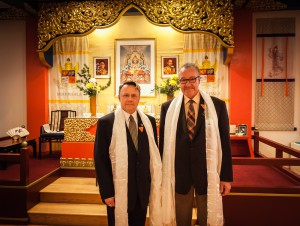
McGee and Avdulov Sensei after receiving the Order of Elegance of Shambhala award (2014), by Marvin Moore
photos by Marvin Moore and Liza Matthews
On Shambhala Day, March 2nd, 2014 the Sakyong awarded tea masters John Soyu McGee Sensei and Alexandre Soro Avdulov Sensei The Order of Elegance of Shambhala for their outstanding contribution to the culture of Shambhala.
This acknowledgement is particularly timely as this year marks the fifteenth anniversary of their arrival in the province of Nova Scotia and the tenth anniversary of the completion of Yukoan, a traditional Japanese tea room within the Halifax Shambhala Center.
Referring to McGee Sensei and Avdulov Sensei in his letter as “treasured master warriors,” the Sakyong said, “You have tirelessly upheld the principles of Shambhala and furthered the practice of fearless warriorship while holding the tea fan of compassion at your heart. Your genuineness, confidence, bravery, unflagging exertion, and patience are an example to all, worthy of our praise and emulation.”
A small but dedicated Kalapa Cha group, inspired to study Chado by Trungpa Rinpoche and longing for a teacher and a way to move forward with their practice, learned in 1999 that – incredibly – two esteemed tea masters were about to move to Nova Scotia, from Kyoto. Canadian John Soyu McGee, Sensei, the first Canadian-born tea master, had been the attaché and interpreter for the Grand Master of Urasenke Soshitsu Sen XV. He also served as the Director of the Office of International Affairs of Urasenke Foundation and taught extensively both Japanese and non-Japanese students of tea. In 1999 he received a citation from the Prime Minister of Canada for his contribution to the relations between Canada and Japan.Alexandre Soro Avdulov, Sensei, the first Russian and Eastern European tea master, who was born and educated in Moscow, is one of the foremost teachers to have studied at Urasenke in both their English and Japanese schools. He has also taught both Japanese and international students of tea and is now an Associate Professor and a coordinator of Japanese Language and Culture Programme at the Department of Modern Languages and Classics at Saint Mary’s University in Halifax.
Once settled, the senseis began to teach the five or six students in the Shambhala center with a portable eight-tatami-mat floor covering unrolled and laid out on the carpeted floor. Avdulov Sensei skillfully and patiently began to work with us, coming to understand what we knew and what we didn’t know (which was a lot!).
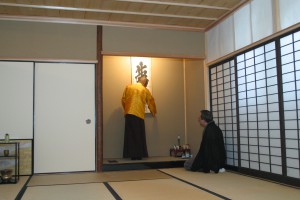
The Sakyong unrolling the scroll Roar of the Tiger to officially open the tea room 2004, photo by Marvin Moore
With the help of funds raised by McGee Sensei and Avdulov Sensei from their generous friends around the world and donations from sangha members, Yukoan was completed in the summer of 2004, exactly ten years ago.
As we gently slide open the framed paper door and enter the tea room, ordinary reference points fade away. We’re in a room that, for a short while, allows host and guests to rest in a shared space of nowness. Coming together with open hearts, host and guests engage in a centuries-old practice: the simple act of serving and receiving a bowl of tea.
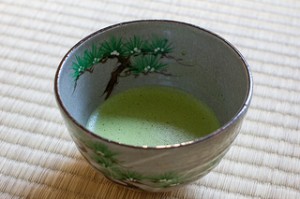 These qualities are highlighted by the fleeting nature of things. Ichi-go, ichi-e is a phrase in Japanese that means one time, one meeting. This coming together of host and guests is unique and will never occur in the same way again. The truth of impermanence, the precision and elegance of the form, and the sincerity we bring to the gathering bring us to a place of deep appreciation and celebration.
These qualities are highlighted by the fleeting nature of things. Ichi-go, ichi-e is a phrase in Japanese that means one time, one meeting. This coming together of host and guests is unique and will never occur in the same way again. The truth of impermanence, the precision and elegance of the form, and the sincerity we bring to the gathering bring us to a place of deep appreciation and celebration.
As a skillful means of joining heaven and earth, tea practice reveals the sacredness in everyday activity. Our senses awaken when we hear a whisper of wind in the pines as the fire heats the water for tea, see steam rise from the kettle, listen to the sound of water poured from the bamboo ladle, or catch the shockingly beautiful fragrance of the incense being slowly warmed by the charcoal fire.
In the simplicity of a space free of clutter, we are moved by the beauty and meaning of the calligraphy on the scroll, the unpretentious arrangement of flowers, and the carefully chosen utensils. Though little is said and few looks exchanged, the atmosphere is intimate.
The Sakyong said recently that when entering the tea room one experiences beauty, grace, decorum, and dignity — the maturation of gentleness.
Yukoan today is a place of practice directed both inward and outwards. It is one of a very few places in the world outside Japan where all aspects of Chanoyu are taught and practiced. During the year public tea gatherings are held. These chakai include the First Tea of the Year, Spring Festival, Flower Viewing, Star Festival, Moon Viewing, and the Last Tea of the Year.
Yukoan, as well as being a space for tea practice, presentations, and celebrations, is also used and enjoyed by the Shambhala center members for discussion groups, practice, small meetings, and meditation interviews, allowing the aesthetics of Chanoyu to permeate the Shambhala practices.
For the past two years a sizable group of Saint Mary’s University students have been coming to Yukoan once a week to study Japanese aesthetics. Many of them have become interested in meditation and other Shambhala arts.
McGee Sensei and Avdulov Sensei have offered tea at a Kalapa Lodge event, a Magyel Pomra Encampment, at a ceremony in Kalapa Valley, to the Sakyong and Sakyong Wangmo following their wedding ceremony in Halifax and at a Warrior Assembly at Dorje Denma Ling.
To commemorate the tenth anniversary of the Abode of the Equable Tiger the Senseis embarked on a pilgrimage to offer tea at important places around the province.
They began with Chanoyu at Grand Parade – the traditional gathering place of the people of Nova Scotia. The Mayor of Halifax, the Honorable Mike Savage and the Consul General of Japan in Montreal, Tatsuo Arai were the principal guests. Over one hundred Haligonians enjoyed tea at the Grand Parade that day.As well, the Senseis traveled to Dorje Denma Ling to offer tea as a part of the 20th anniversary celebrations of the center. Later they traveled to Gampo Abbey and took part in the 30th anniversary events, offering tea to Ani Pema Chodron as well as to the monastic and local sangha.
Kalapa Cha is profoundly grateful for the presence and generosity of McGee Sensei and Avdulov Sensei. As well as enriching the culture of Shambhala, their commitment to transmit and teach the purest form of the practice of Chanoyu within Shambhala is a gift we hope continues for generations to come.

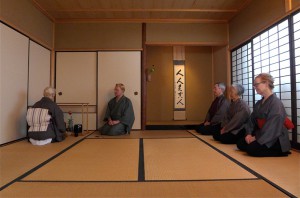
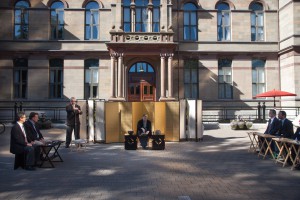




Jul 27, 2014
Reply
Incredible good fortune for all to have these connections! The Shambhala community is very grateful.